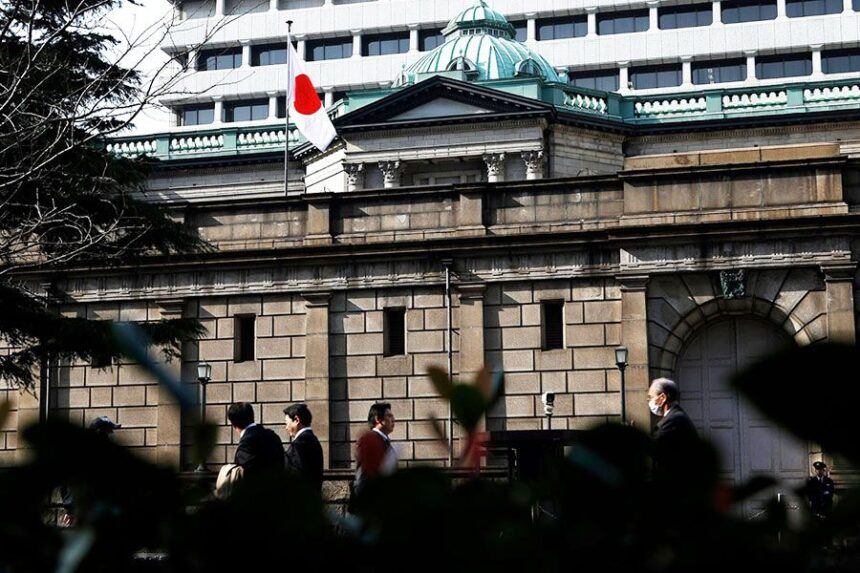The Bank of Japan (BOJ) announced on Thursday that it would maintain its policy rate at 0.5% for the second consecutive meeting, as trade tensions, particularly U.S. President Donald Trump’s tariffs, continue to challenge Japan’s economic outlook. The decision comes as global trade discussions remain fraught with uncertainty, particularly regarding tariff threats from the U.S. that could impact Japan’s exports and broader economic performance.
Trade Tensions and Global Economic Slowdown Weigh on Japan
Japan’s central bank faced the dilemma of balancing inflationary pressures with the risks posed by the ongoing global trade tensions. U.S. tariffs, including a reciprocal tariff threat, have weighed heavily on Japan’s export-driven economy. The Bank Of Japan noted that while Japan has seen headline inflation above its 2% target for 36 months, this provides an opportunity to raise rates, provided economic conditions stabilize. However, the central bank has stressed that Trump’s tariffs and a slowdown in global growth are complicating plans to normalize monetary policy.
The Bank of Japan policy statement highlighted the likelihood of Japan’s growth moderating due to external economic headwinds, such as decelerating growth in key trading partners and a drop in domestic corporate profits. In line with this, Japan’s inflation is expected to remain within a range of 2-2.5% for fiscal year 2025, before moderating to 1.5-2% in fiscal year 2026. The Bank Of Japan outlook suggests inflation will hover around the 2% mark through fiscal year 2027, allowing some room for monetary policy adjustments, but any policy shifts will depend on the realization of its economic forecasts.
Read: Shocking Economic Setback: US GDP Shrinks in Trump’s First 100 Days Amid Tariff Turmoil
Economic Growth Faces Downside Risks, Yen Weakens Against Dollar
Japan’s economy showed signs of slowing in the first quarter of 2024. In the fourth quarter of 2023, Japan’s GDP grew by 1.2% year-on-year, but the country’s full-year GDP growth in 2024 was a meager 0.1%, sharply down from 1.5% growth seen in 2023. With trade talks between the U.S. and Japan failing to yield significant breakthroughs in recent weeks, concerns over export pressures and the broader economic slowdown have intensified.
In response to the BOJ’s decision, Japan’s stock market showed modest gains, with the Nikkei 225 rising 0.54% and the broader Topix index climbing 0.23%. However, Japan’s currency, the yen, weakened by 0.29%, trading at 143.49 against the U.S. dollar. The yen’s performance has been a focal point in trade talks, as U.S. President Trump has criticized Japan for its efforts to maintain a weak yen. Since Japan’s shift away from its ultra-loose monetary policy in March 2024, the yen has appreciated nearly 5% against the U.S. dollar, a trend that has prompted further tension in bilateral relations.
Despite U.S. pressure, Japanese Finance Minister Katsunobu Kato denied claims that U.S. Treasury Secretary Scott Bessent had expressed support for a strong yen, underlining the complex and ongoing diplomatic discussions regarding currency value and trade policies.
Also read: Tariff Troubles: US Taxes Are Making Chinese Factories Pause Production, Search For New Customers
Tariffs and Economic Risks Could Alter BOJ Policy
Looking ahead, the Bank of Japan faces several key challenges. According to Citi Research, Japanese exports to the U.S. are expected to come under pressure due to tariffs, including a 10% reciprocal tariff and a 25% auto tariff. This could negatively impact Japan’s economy, particularly in relation to its key trading partner, China. Citi anticipates that Japan’s exports will face increasing headwinds, which may be exacerbated by slower U.S. consumer spending and employment.
Nomura’s analysts have forecast that the Bank Of Japan will maintain its stance on rate hikes, although the rising downside risks from global economic factors and U.S. tariff policies suggest a cautious approach. While the BOJ is unlikely to rush into rate hikes, it remains to be seen whether its next move will be a rate increase or a more dovish stance, depending on the evolution of global trade conditions.
In light of these developments, both Citi and Nomura analysts are closely monitoring trade relations, particularly with the U.S. and China, as well as the broader global economic climate. The BOJ’s response to these risks will be pivotal in shaping Japan’s monetary policy in the coming months.
Follow 10X Times for more business news updates.






